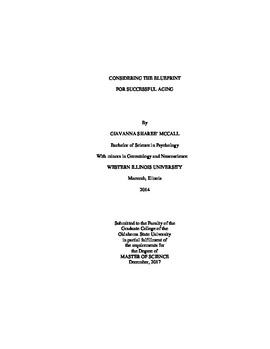| dc.description.abstract | The purpose of this study was to examine the three core principles of the Successful Aging Model in order to advance a blueprint for successful aging. Data from this study consisted of a sample of N = 152 older adults, aged 65 and older, residing in private homes and assisted/long-term care facilities. A series of three hierarchical linear regression analyses were conducted and analyzed to determine the associations between key predictor variables and successful aging outcomes (health, cognitive status, and social support). After controlling for demographic variables, psychosocial attributes, religion/spirituality, and life appraisal variables, a significant negative association emerged between perceived health (β = -.30, p < .05) and self-reported health conditions. However, a significant positive association was evident between psychosomatic symptoms (β = .27, p < .05) and self-reported health conditions. It appears that older adults who maintained positive health perceptions also reported fewer self-reported health problems. However, older adults with greater psychosomatic health complaints endorsed greater self-reported health conditions. In a second hierarchical regression analysis, education (β = .32, p < .05) and spirituality (β = .26, p < .05) had a significant positive association with cognitive status. Higher educational attainment and higher rates of spiritual involvement were key indicators of cognitive functioning. Lastly, a third hierarchical regression analysis revealed a significant positive association between education (β = .28, p < .05) and stress (β = .24, p < .05) and social support, whereas loneliness (β = -.61, p < .05) maintained a significant negative association. Thus, older adults who feel more supported by others appeared to be better educated and less stressed; whereas older adults who feel unsupported by others experience greater loneliness. Overall findings from this study provide evidence-based identification of associated health, cognitive, and social indicators of successful aging. Study results have implications relative to confirming underlying attributes that contribute to a successful old age. | |
